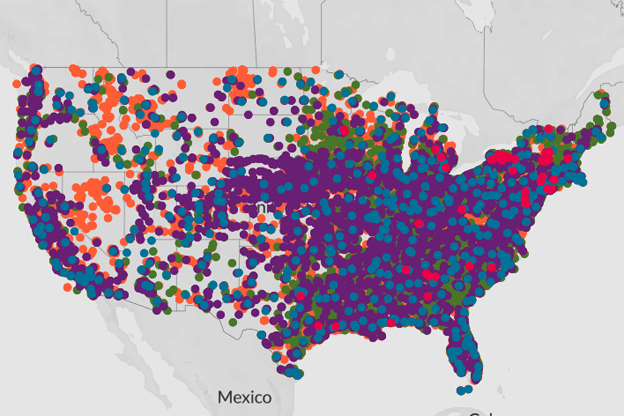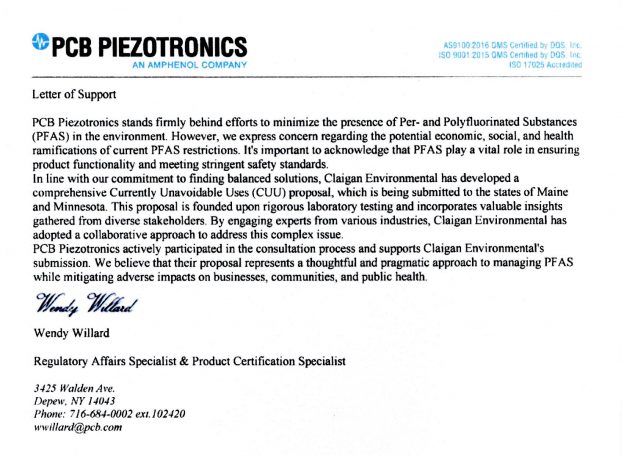

The scourge of PFAS
In 2023, the Minnesota Legislature enacted “Amara’s Law” to ban “nonessential” use of PFAS chemicals in Minnesota. It was named in honor of Amara Strande, a young PFAS cancer victim who spent the last months of her life lobbying the legislature to pass the law. PFAS are carcinogenic chemicals, which cause other serious health problems, too, and are found to be contaminating soil and water, in Minnesota and elsewhere, and especially in the east metro where Strande lived. These chemicals were first invented by 3M and have been manufactured by it in the east metro since the 1940s. One of the big problems with PFAS is that they don’t break down; they are called “forever” chemicals.
The law, Minn. Stat. § 116.943 (2023), prohibited many consumer products using PFAS right away, e.g., carpets, cleaning products, cosmetics, dental floss, juvenile products, textile treatment, etc. For everything else, the ban does not commence for about eight years. Even then, it creates an exception for “currently unavoidable uses” of PFAS chemicals. To figure out what those uses are, the legislature directed the Minnesota Pollution Control Agency to make rules about “currently unavoidable uses.” To do that, the MPCA sent out a request for comments about how it should approach the matter. The comment period closed on March 1st.
Parenthetically, even when implemented, the law stops the sale and use of PFAS products, not the cleanup of existing PFAS. There was an article in the Star Tribune on March 28, 2024, about a PFAS tainted drinking water well in Stillwater that the city mums and dads weren’t exactly forthcoming about. Former governor Arne Carlson, a great champion of clean water, complained about it.
The request for comments provoked the usual stampede of industry flacks in sackcloth wailing about how their use of PFAS chemicals was not only unavoidable, but necessary and desirable to the survival of the economy (and themselves, not coincidentally). A battery manufacturers association from Japan wrote in, as did a company that manufactures sunglasses and ski goggles. My favorite one, though, is this:

Letter comment filed with the MPCA
When a firm has “PCB” in its name, you know its heart is probably in the right spot. PFAS are the new PCBs.
The letter is one of the better corporate BS letters I’ve read in a while (I’m retired), full of standing firmly, expressing concern, vital roles, balanced solutions, diverse stakeholders, valuable insights, complex issues, thoughtful and pragmatic approaches, blah, blah, blah.
Wendy has a way with words.
One thing is notable in this word salad, though: the reference to Claigan Environmental and what it is proposing.
It turns out that Claigan Environmental is an Ottawa, Canada company with a sort of Orwellian name that:
OTTAWA, ON, Jan. 29, 2024 /CNW/ – On January 24th, Claigan Environmental Inc. (www.claigan.com) announced a strategic project to apply for Currently Unavoidable Use (CUU) exemptions for PFAS in Maine and Minnesota.
Who asked a company in Ottawa to do this? Well, we don’t know, but we do know from the press release that Claigan wants to get more clients on the bus.
Claigan Environmental has apparently been lobbying the MPCA since as early as January on the PFAS exception issue. We’re entitled to know who hired them to do that.
Trying to influence a state agency on rulemaking is lobbying. It requires registration. Claigan isn’t registered. If it did register and disclose its lobbying expenses and principals, I am sure we’d find a lot of the usual suspects. Probably some of the dots on the map shown above.
Update 4/1/24 (really): I was sufficiently alarmed by Claigan’s efforts to influence PCA rulemaking that I filed a complaint with the Minnesota Campaign Finance and Public Disclosure Board. You can read it at the link.
Thanks for your feedback. If we like what you have to say, it may appear in a future post of reader reactions.

